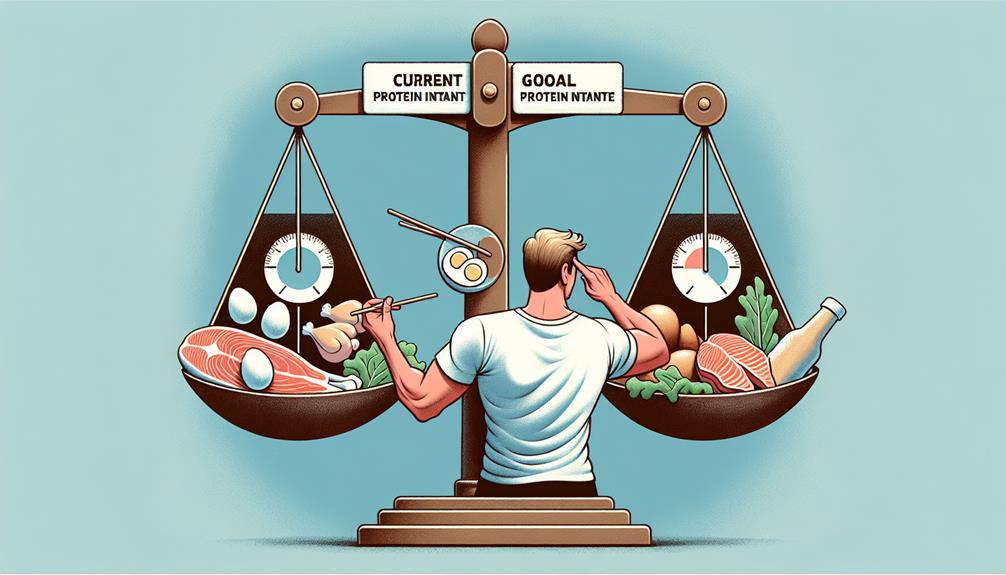Protein Intake Calculator
Did you know that protein is essential for building and repairing tissues in your body, including muscles, organs, and skin? Understanding how to meet your daily protein requirements can be a game-changer for your overall health and fitness goals. By utilizing a protein intake calculator, you can tailor your diet to ensure you are getting the right amount of this crucial nutrient. But how does it really work, and what factors should you consider when determining your protein needs? Let's explore how this tool can help you optimize your dietary intake and achieve your wellness objectives.
Key Takeaways
- Protein is essential for tissue building, metabolism, and overall health.
- Personalized protein intake is crucial for optimal health maintenance.
- Diversifying protein sources ensures essential amino acids and nutrients.
- Adjust protein intake based on individual needs, goals, and activity levels.
Importance of Protein in Diet
Understanding the crucial role that protein plays in your diet is essential for maintaining optimal health and supporting various bodily functions. Proteins are vital for building and repairing tissues, producing enzymes and hormones, and supporting the immune system. Including a variety of protein sources in your diet, such as lean meats, poultry, fish, legumes, nuts, and dairy products, offers numerous benefits. These include improved muscle strength, better satiety levels, and enhanced metabolism.
Not consuming enough protein can lead to protein deficiency, resulting in health risks like muscle loss, weakened immune function, and slower wound healing. It is important to ensure you meet your daily protein requirements based on factors like age, weight, and activity level. By incorporating adequate protein sources into your meals, you can help prevent these deficiencies and support overall well-being. Remember, a balanced diet that includes sufficient protein is key to maintaining a healthy lifestyle.
How the Calculator Works
To efficiently determine your protein intake needs, utilize the protein intake calculator provided below. This calculator works by taking into account factors such as your age, gender, weight, height, activity level, and fitness goals to provide you with a personalized protein requirement. It calculates the recommended daily protein intake based on established guidelines and scientific research.
When using the calculator, it's important to understand that while it provides a good estimate of your protein needs, it may have limitations. Individual variations in metabolism, health conditions, and other factors can influence your actual protein requirements. Therefore, the calculated value should be considered a starting point and can be adjusted based on how your body responds.
Remember that meeting your protein needs through a variety of sources is essential for overall health. Incorporating a mix of animal and plant-based proteins ensures that you receive all the essential amino acids and other nutrients necessary for optimal functioning. By understanding the calculator's accuracy and limitations and diversifying your protein sources, you can better meet your dietary needs.
Factors Affecting Protein Needs

Factors influencing protein needs encompass a range of variables including age, physical activity level, muscle mass, and overall health status. When determining your protein requirements, consider the following factors:
- Exercise Intensity: The more intense your workouts, the higher your protein needs to support muscle repair and growth.
- Age Requirements: Protein needs may vary based on age, with older adults often requiring more protein to prevent muscle loss and maintain function.
- Muscle Mass: Individuals with higher muscle mass typically need more protein to support muscle maintenance and growth.
- Physical Activity Level: Active individuals, especially athletes, generally require more protein to meet their body's demands for repair and recovery.
- Health Status: Certain health conditions or illnesses can increase protein requirements to aid in healing and maintain muscle mass.
Understanding these factors can help you tailor your protein intake to meet your body's specific needs, ensuring optimal health and performance. Next, we'll explore tips for achieving your protein intake goals.
Tips for Optimal Protein Intake
For optimal protein intake, ensure you include a variety of protein sources in your daily meals to meet your body's needs efficiently. Protein sources can vary greatly in terms of their amino acid profiles and nutrient contents, so diversifying your choices can help you obtain a wider array of essential nutrients. When meal planning, aim to incorporate different types of proteins such as lean meats, poultry, fish, legumes, nuts, seeds, dairy, and plant-based alternatives. This approach not only helps in meeting your protein requirements but also ensures a well-rounded diet. Below is a table highlighting various protein sources to consider including in your meals:
| Protein Source | Protein Content per 100g | Additional Benefits |
|---|---|---|
| Chicken Breast | 31g | High in lean protein |
| Black Beans | 21g | Good source of fiber |
| Greek Yogurt | 10g | Rich in probiotics |
| Almonds | 21g | High in healthy fats |
Adjusting Protein Intake for Goals

Considering your fitness goals and lifestyle, adjusting your protein intake can be a key factor in optimizing your nutritional plan for success. To ensure you are meeting your goals effectively, here are some essential tips to help you adjust your protein intake:
- Protein sources: Incorporate a variety of protein sources into your diet, such as lean meats, poultry, fish, legumes, dairy, and plant-based options.
- Muscle growth: If your goal is to build muscle, aim to consume around 1.2-2.0 grams of protein per kilogram of body weight to support muscle repair and growth.
- Timing: Distribute your protein intake evenly throughout the day to maximize muscle protein synthesis.
- Activity level: Adjust your protein intake based on your activity level, with higher protein needs for those engaging in intense exercise or endurance training.
- Consult a professional: Consider consulting a dietitian or nutritionist to help tailor your protein intake to your specific goals and lifestyle.
Frequently Asked Questions
Can Protein Intake Affect Muscle Growth and Recovery After Exercise?
Yes, protein intake significantly impacts muscle growth and recovery post-exercise. Timing protein consumption around workouts is beneficial for muscle repair. Supplements can be effective but getting protein from whole foods is optimal for overall health.
Are There Any Potential Side Effects of Consuming Too Much Protein?
Consuming excess protein can lead to digestive issues like bloating and discomfort. Over time, it may strain kidney function, especially if you have pre-existing kidney problems. Moderation is key for optimal health.
How Does Age Impact Protein Needs and Absorption in the Body?
As you age, protein needs may increase to support muscle maintenance and repair. Digestive enzymes can decline with age, affecting protein absorption. Protein synthesis efficiency decreases, emphasizing the importance of balanced protein intake and proper digestion for optimal health.
Is It Possible to Meet Protein Needs Solely Through Plant-Based Sources?
Yes, you can meet your protein needs solely through plant-based sources. Plant-based proteins vary in quality, so combining different sources ensures complete amino acid profiles. Supplements can help if needed. Timing is less critical than total intake for protein synthesis and digestion efficiency.
Can Certain Medical Conditions or Medications Affect Protein Requirements?
When it comes to protein requirements, certain medical conditions or medications can impact your needs. Medical conditions and medication interactions may alter the amount of protein your body needs for optimal health and function.
Conclusion
In conclusion, the protein intake calculator is a valuable tool for ensuring you meet your dietary needs. By taking into account factors such as activity level, age, and goals, you can tailor your protein intake to optimize your health and fitness. Remember, balancing protein sources and timing is key to reaching your nutritional goals. So, don't wait, start using the calculator today to take the guesswork out of meeting your protein needs!












